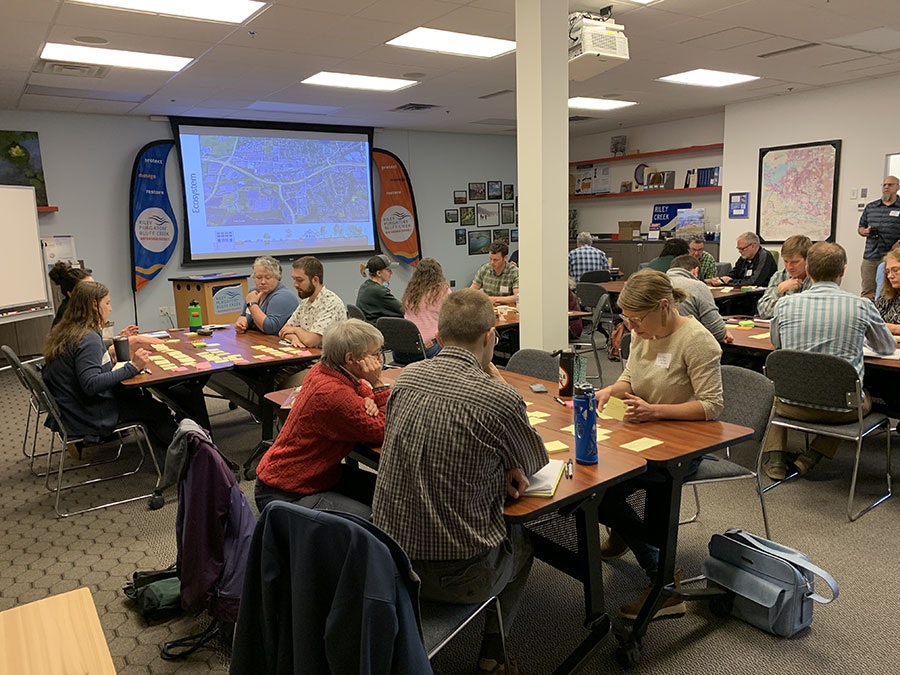EHAP
Overview
The RPBCWD Board of Managers approved development of the Ecosystem Health Action Plan (EHAP) in February 2023. The purpose of EHAP was to inform, through an ecosystem lens, development of the update to the 10-year management plan.
The EHAP effort consisted of the following tasks:
- Review of relevant literature and district projects/programs
- GIS data collection and map development
- Soil health investigation and fieldwork
- Technical Advisory Panel workshop facilitation
- EHAP development


Plan Components
The action plan will include:
- A vision and goals for ecosystem health within RPBCWD
- A description of historic land use that has altered ecosystem function
- A description of existing ecological conditions
- Maps showing climate change and urban heat island areas of vulnerability within RPBCWD
- A summary of how RPBCWD current programs, projects, and regulatory activities align with an ecological approach and authorities
- A summary of ecosystem function issues and opportunities for preservation, management, or enhancement
- A description of ecosystem function improvement strategies
- A description of existing and potential partners for the District to achieve ecosystem function improvements
- A description of short and long-term priorities for implementation of ecosystem health initiatives
EHAP Documents
Memo about EHAP scope (2/1/2023)Existing Conditions Map (6/15/2023)Final Report: Ecosystem Health Action Plan - August 2024
Development of the Plan
Timeline
| February 1, 2023 | Board of Managers approves EHAP development |
| May 18, 2023 | EHAP TAP Workshop 1 |
| June 15, 2023 | EHAP TAP Workshop 2 |
| July 20, 2023 | EHAP TAP Workshop 3 |
| January 2024 | EHAP TAP Workshop 4 - Separate focus groups on January 3, 11, and 17 |
| March 11, 2024 | Joint workshop with RBPCWD Board of Managers and CAC members |
| August 7, 2024 | BOM Workshop - EHAP Final Report |
Technical Advisory Panel
A Technical Advisory Panel (TAP) was formed to provide input during the EHAP development process. The panel includes representives from multiple disciplines in city, county and state governments and other organizations. A series of TAP workshops are being faciliated to identify challenges and opportunities for fostering a healthy urban ecosystem. View the list of TAP partners.

Workshop Materials
TAP WORKSHOP 1: IDENTIFYING CHALLENGES TO A HEALTHY URBAN ECOSYSTEM (5/18/2023)
Slides from workshop 1TAP WORKSHOP 2: IDENTIFYING EFFORTS AND GAPS IN SUPPORTING A HEALTHY ECOSYSTEM (6/15/2023)
Slides from workshop 2TAP WORKSHOP 3: IDENTIFYING SOLUTIONS TO ECOSYSTEM HEALTH ISSUES
Gaps identified in workshop 2 for consideration in workshop 3Summary of solutions identified
TAP WORKSHOP 4: FOCUS GROUPS TO PRIORITIZE POSSIBLE SOLUTIONS
- Three workshops were held separately with TAP members divided into these focus areas: natural resources, planning, and water resources engineering. The results of the this and the other TAP workshops will be brought to the joint BOM/CAC workshop scheduled for March 11, 2024.
JOINT WORKSHOP WITH BOARD OF MANAGERS AND CITIZEN ADVISORY COMMITTEE (3/11/2024)
Presentation slides- Topics for breakout sessions: Discuss ideas for RPBCWD mission statement revision; prioritize potential actionable items
